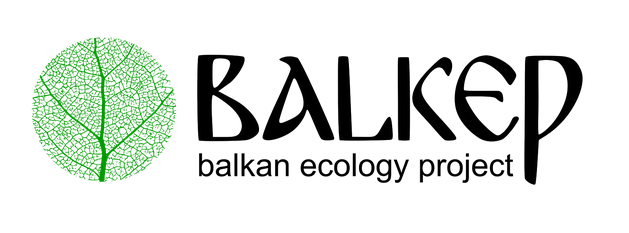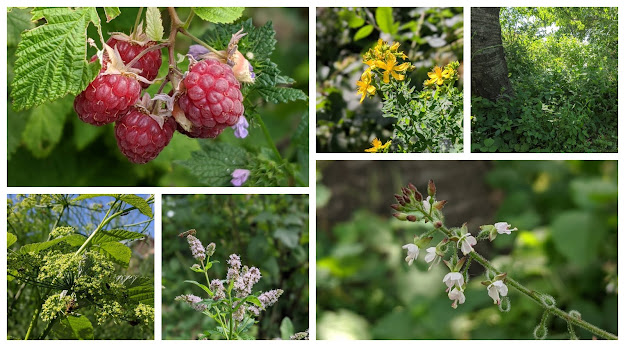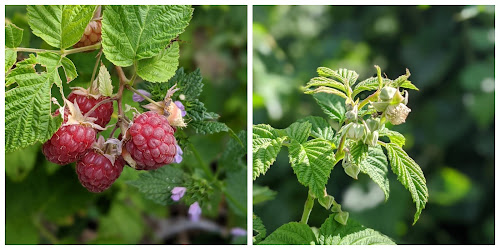This week, we are taking a look at some ground cover plants, experimenting with pruning Raspberries and thinking a bit more about beneficial insects and how we can categorise the kind of support they provide us with in our gardens. We also have some glad tidings to share from our feathered friends....welcome to The Polyculture Project - Week 18.
We've been experimenting with pruning the raspberries at different times of the year in order to try and prolong the fruiting period. The raspberries we did not prune from last season are producing their final crop (photo on the left) and the raspberries we did prune are just starting to flower (photo on the right). We're finding pruning half of the raspberries in the autumn is an easy way to get fruits from late May through to October.
While on a road trip with my brother in the Rhodopes mountains 4 or 5 years ago, we came across a small landslide where several upturned plants lay. I rescued some of the plants from the pile and planted them under the relatively deep shade of a mature cherry tree in the home garden, seeing as the plants had come from a shady mountainside.
5 years later, one plant, in particular, has done extremely well, that is Circaea lutetiana - Enchanter's nightshade.
Circaea lutetiana - Enchanter's nightshade
Circaea lutetiana - Enchanter's Nightshade makes excellent ground cover in a woodland area. You can see the ground cover below the cherry tree in this photo, where C. lutetiana it has established itself well while not being overwhelming. This is probably because it is growing alongside other plants that prevent it from overtaking, including Dewberry - Rubus caesius. C. lutetiana is often considered a weed, but what's great about designing layers in a polyculture, is that when grown with other plants, the ability of a plant to spread and monopolize the area is greatly reduced.
Circaea lutetiana growing with Rubus caesius
Rubus caesius - Dewberry, another excellent plant for ground cover. One plant can grow to around 1m in width, thereby covering quite a large area. Lots of beneficial insects are attracted to the blooms, and the fruits are palatable and can be used to make preserves.
We are always encouraging Heracleum sphondylium, commonly known as Hogweed, in our gardens. The plants grow at the base of fruit trees, among our Rubus idaeus cv. - Raspberry. patch and in wild strips and islands throughout the gardens. Part of the Apiacea family, this plant can grow up to 2m long, with hairy, ridged hollow stems. It's an excellent plant for animal fodder (the pigs and rabbits love the leaves), biomass production, and for attracting beneficial insects that feed on the pollen and nectar and use the hollow stems to overwinter.
We speak a lot about beneficial organisms, so I thought it would be good to expand upon this term a bit. All organisms are beneficial, at the very least all organisms past, present and future decompose to nourish something else, but when we speak of beneficial organisms we are speaking of those organisms that provide clear and present benefits, specifically to our polyculture activity. Beneficial organisms, or Borgs as I prefer to shorten it, are a very decent group of organisms that make great partners in the polyculture landscape offering, as the name implies, benefits to our activity of growing the stuff we need. They seem to be happy to carry out these duties providing we supply (or at the very least don’t destroy) suitable living conditions for them, i.e, their habitat.
The benefits these organisms offer come mainly in the form of increasing the productivity of our crops via pollination support, protecting our crops from pests via pest predation and providing fertility to our crops via their roles in decomposing organic matter and supplying nutrients, fertility provision.
If you're interested in learning more about the support Borgs can provide us within our landscapes, and how to attract them Week 9 of our Regenerative Landscape Design Course - Working with the Wild, is available to purchase as a stand-alone module, or as part of our current online Regenerative Landscape Design Course. Registration for 2021 is now open, and you can apply the promo code SUB2021 in the section of the registration form to receive a 25% discount. The offer is valid until the 15th of March 2021.
Welcome to our Online Store where you can find Forest Garden/ Permaculture plants, seeds, bulbs and Polyculture multi-packs along with digital goods and services such as Online Courses, Webinars, eBooks, and Online Consultancy. We hope you enjoy the store and find something you like :) It's your purchases that keep our Project going. Yuu can also find our full list of trees. shrubs and herbs for forest gardens on our website here
Hibiscus syriacus - Rose of Sharon, flowering in the home garden. It's a beautiful shrub, that takes well to pruning and can be used as a very pretty hedge or a stand-alone ornamental.
Hypericum perforatum - St Johns Wort in flower in the nursery. A herbaceous perennial that giving the correct conditions will spread forming a very attractive drought tolerant ground cover. The plant has a long history of medicinal use and has established a place in modern medicine as a treatment for depression.
We're thrilled to announce the first clutch of eggs have successfully hatched! The little ducklings not even a day old made a bee line for the pond and spent a happy hour diving into the depths before we moved them, and mother, safely into their house and secure area We've lost very small ducklings before, so this year we'd like to try and protect them until they are a few weeks old and big enough to roam the gardens. For more on our work and gardens, and a video of the ducks, you can follow us on Instagram.
Regenerative Landscape Design - Online Interactive Course
Want to learn how to design, build and manage regenerative landscapes? Join us for our Regenerative Landscape Design - Online Interactive Course from May 1st to Sep 13th, 2023.
We're super excited about running the course and look forward to providing you with the confidence, inspiration, and opportunity to design, build and manage regenerative landscapes, gardens, and farms that produce food and other resources for humans while enhancing biodiversity.

Regenerative Landscape Design Online Course
You can find out all about the course here and right now we have a 20% discount on the full enrollment fees. Just use the promo code RLD2023 in the section of the registration form to receive your discount.
We are looking forward to providing you with this unique online learning experience - as far as we know, the very first of its kind. If you are thinking of reasons why you should do this course and whether this course is suitable for you, take a look here where we lay it all out. Looking forward to it!
We're super excited about running the course and look forward to providing you with the confidence, inspiration, and opportunity to design, build and manage regenerative landscapes, gardens, and farms that produce food and other resources for humans while enhancing biodiversity.
 |
| Regenerative Landscape Design Online Course |
You can find out all about the course here and right now we have a 20% discount on the full enrollment fees. Just use the promo code RLD2023 in the section of the registration form to receive your discount.
We are looking forward to providing you with this unique online learning experience - as far as we know, the very first of its kind. If you are thinking of reasons why you should do this course and whether this course is suitable for you, take a look here where we lay it all out. Looking forward to it!
--------------------------------------------------------------------------------------------------------------------------
Support Our Project
If you appreciate the work we are doing you can show your support in several ways.
- Make a purchase of plants or seeds from our Bionursery or Online Store
- Consider joining us for one of our Courses or Online Courses
- Comment, like, and share our content on social media.
- Donate directly via PayPal to balkanecologyproject@gmail.com or via FTX Pay
If you appreciate the work we are doing you can show your support in several ways.
- Make a purchase of plants or seeds from our Bionursery or Online Store
- Consider joining us for one of our Courses or Online Courses
- Comment, like, and share our content on social media.
- Donate directly via PayPal to balkanecologyproject@gmail.com or via FTX Pay
 |
| You can also register for our online training, services, and products directly here. |

















A very nice informative website. I have practiced and taught agroecology for 40 yrs. My blog is; frankholzman.blogspot.com
ReplyDelete